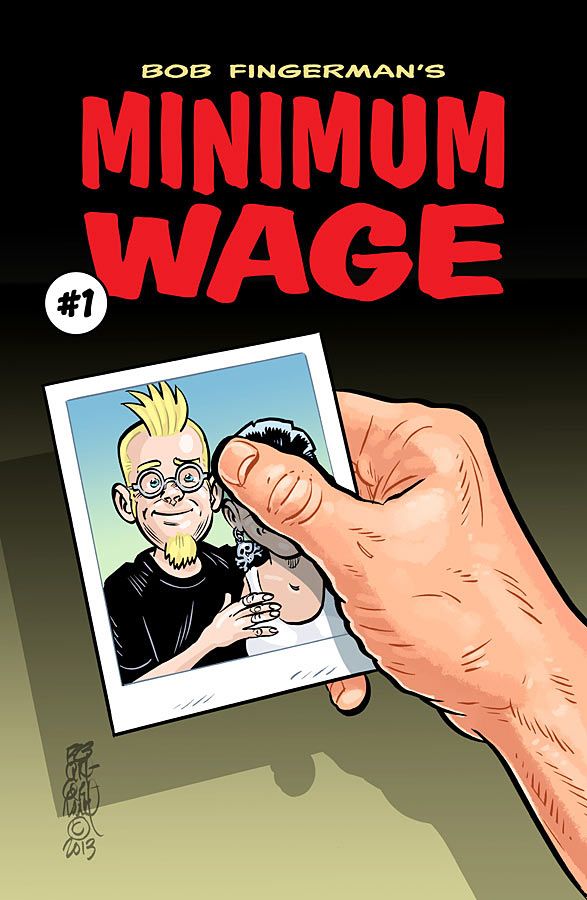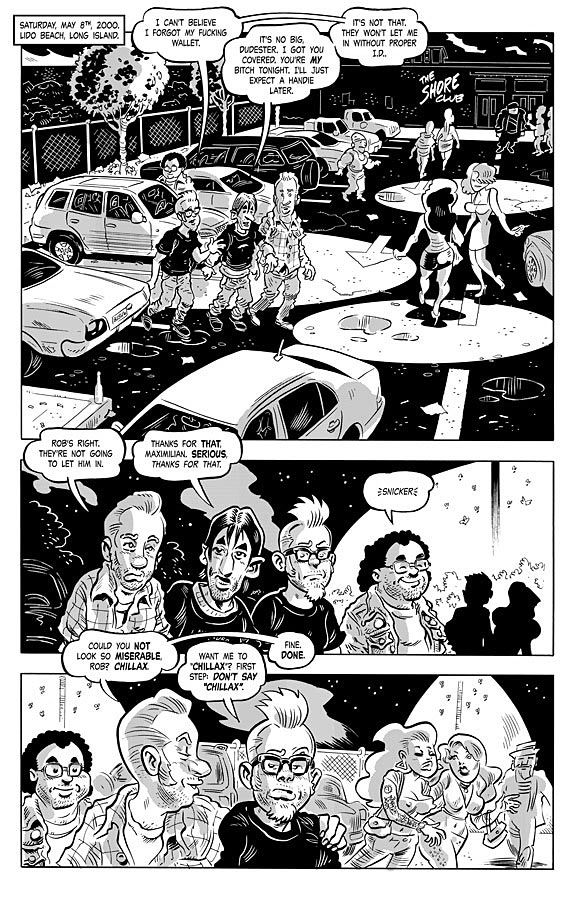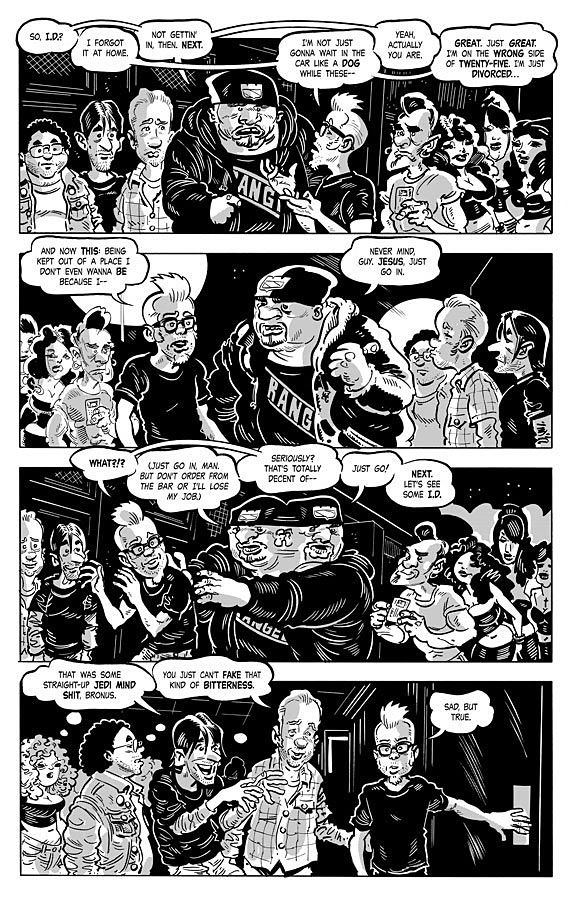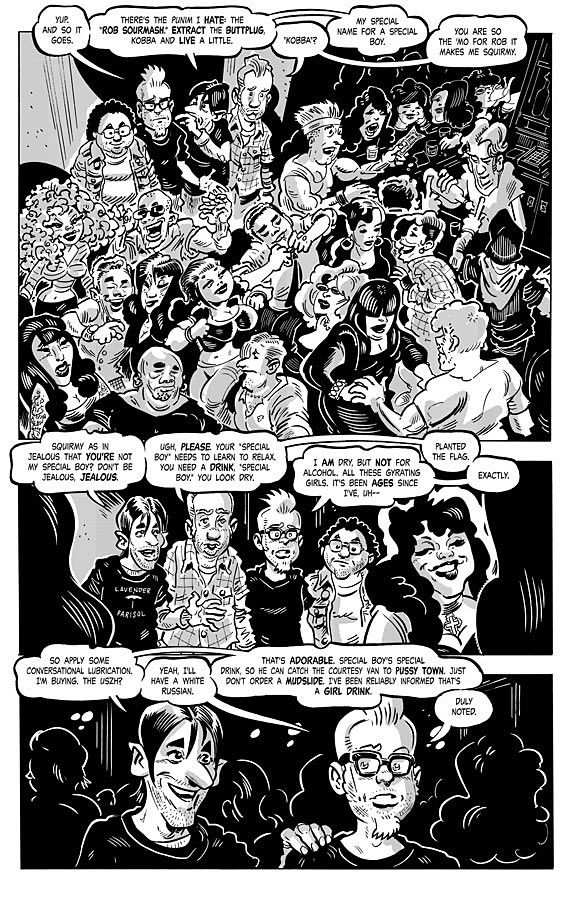Fifteen years ago, Bob Fingerman ended his acclaimed indie series "Minimum Wage" in 1999 with protagonist Rob marrying his girlfriend Sylvia. It was a surprisingly happy ending for a work that is considered to be the origin of cringe comedy -- that is, situational comedy built on readers suffering through vicarious embarrassment for the characters. Shows like "Curb Your Enthusiasm," "Louie" and "Girls" have emulated this technique, resulting in the creation of an entire genre rich with discomfort. Earlier this year, Image Comics published a hardcover collection of the series, "Maximum Minimum Wage," which was met with critical acclaim. In the wake of its success, Fingerman decided to return to the series once again.
In January 2014, "Minimum Wage" picks back up as an ongoing series, dropping in on Rob three years after the conclusion of the original run. His happy ending is over, and Rob is now divorced and living with his mother. CBR News was part of a round table press call with Fingerman late last week to discuss his long-awaited return to the series, his reaction to inciting a comedy movement and his plans for future projects.
What is it like to be back working on "Minimum Wage?"
Bob Fingerman: It's both surprising and great in equal measure. I never thought I'd really be working on it again -- not because I didn't want to, but it didn't seem like there would ever be an opportunity to do it the way I wanted to do it until working with Image Comics on the hardcover. That made it seem like it could be a reality again. In real time it's been almost 15 years [since the series ended] but in story time, it's only moved forward 3 years. I didn't want to pick up on Rob and the rest of the cast already beginning to enter early middle age, I still wanted them to be young, but not quite as young.


How is the way you wanted to do the book not necessarily going to work with other publishers? Why is Image the right place?
There aren't that many homes for doing -- I hate this term -- floppies. There aren't that many outlets for doing a serialized comic of an independent nature anymore, and really once Image decided to work with me, I didn't give it any more thought. Before that, I didn't want to do it, no offense, with Fantagraphics. I really enjoyed working with them and I continue to work with them on some other stuff, but I don't even think they do floppies anymore. I wanted to work with a company that had a deeper reach into the direct marker. The whole point in coming back to this is to finally reach a bigger audience than I did before. Image is the company to do it with. For a creator-owned book, Image offers the best deal in terms of a contract. When I was younger, that kind of thing didn't seem as important, but when you've been doing this for as long as I have, you tend to look for the contract that's the most beneficial.
What was the moment that turned coming back to "Minimum Wage" from something you wanted to do, to something you were actually doing?
The main thing that changed was finding a home for it, where I could do it the way I wanted to do it and feel confident that it would stand a chance on the rack. Really it was working with Image on the hardcover that took it from being a pie in the sky idea of coming back to it, to seeming like I should really suggest doing it again. At Image Expo I mentioned to Ron [Richards, Image Comics' director of business development,] that I'd kinda like to start doing this and -- at that point I'd even worked out in my mind the first couple of arcs -- and Ron said to talk to Eric Stephenson. It was as easy as that. It went from being something that haunted me for a lot of years, to being almost too easy to finally implement.
What does Rob's world look like now? What can we look forward to?
The main difference is the story prior was about Rob and his relationship with Sylvia. Now Rob is going through a divorce. We go straight form the final panel of the book of him saying "I do," to now him clearly being in a state of "I don't." We will learn why over the course of the series. I say this now officially: we will never have any flashbacks to the marriage. That isn't the kind of storytelling I want to do. I think it's more fun for readers to fill in the details. There will be little allusions made here and there about why the marriage didn't work.
The book has gotten great critical response from folks like Patton Oswalt and the current era of cringe comedy. A lot of people credit you as being one of the first people to delve into that area. What do you make of that credit given to you?
I wish that I would get that credit. It seems very egotistical to say that. There was no term for it when I was doing it, but in a way I will lay some claim to it. I remember years ago when I was doing the original run of "Minimum Wage" with my previous publisher and I was having a conversation with Peter Bagge, who was working on "Hate." I had always thought, "Why isn't 'Minimum Wage' selling as well as 'Hate?'" Bagge's theory was that "Minimum Wage" got too real and too uncomfortable, so in a way, I guess it was cringe comedy before the term had been coined. I'm certainly happy to own that. I never was seeking to make the comedy in it other than something that hit you on the gut level. I wanted people to experience things as Rob experienced them and I also hope people experience them on a level that is familiar to them. I've had lots of people over the last 10 years come up to me and say that they went through exactly the same thing. No one ever says it with like that big smile like, "Hey! That was great," it's always more like, "Yeah, been there." Hopefully the comic is entertaining and, on some level, therapeutic.
How does going to a monthly publishing schedule change your process versus working in a bigger chunk of publishing time?
The way I did the original when it was coming out serialized back in the late '90s, it wasn't really on any fixed schedule. They would come out as I was able to do them. My working method changed here partly because I'm also banking a bunch of them. I'm midway through the third issue now; the fourth issue will be done by the end of the year. It's creating a cushion so they can actually come out on schedule. I think one of the things that always held it back was that it did come out piecemeal and now readers will know exactly when the next issue will come out and can plan on, hopefully, heading to the shops to pick it up when it's out. Working ahead mentally on the series -- I used to have an outline in my head, but it was very loose. I would write each issue as I went but I had a bigger picture in mind. This time I've actually outlined. I have 18 issues outlined. Having a much clearer idea of where the story is going has changed the way I'm working on it. It's much more efficient now.
You've previously described your work on "Minimum Wage" as quasi-autobiographical. Has anything happened to you in the last 15 years that we will see reflected in the new series?
Yeah. The biggest change -- Rob being single again. I was always cagey about referring to my real life and how it informed the original run, but, I mean, it is a fictionalized version of my first marriage. One of the things that will be a bit different for this new series is a mixing and matching of fiction. There have always been fictional components to the story because I never set out to create and autobiography, partly because I think that can be too self-indulgent and too boring -- editing your life for the best and most interesting material. There will be a bit more mixing and matching of what's real and what's not real in the new series. Over the last decade or so, in addition to doing comics, I also started writing novels. I managed to get a couple published and I've written quite a few that didn't get published. I think as a writer I've grown more confident, so the fiction aspect of "Minimum Wage will be more in the 50% or so range, as opposed to the 20% it used to be. It's more liberating and it gives me more material to work with. If I'm purely leaning on my own life, I don't think I'd have as much material to work with.
While the original run featured more autobiographical stories, Fingerman said there will be more fiction in the new series
In the previous series, Rob goes from doing independent comics to working on a mainstream book. Can you talk about the character's transition, and on the period of time where you did that type of work?
That's going back to the previous question -- that does reflect my life probably a bit more accurately. I worked on a franchise book in the early '90s and it really was going straight from doing adult comics to working on this completely kid-friendly thing. Even though the beginning of my career was working for "Cracked" magazine and Rob's character worked for a fictionalized version of that. I'd done kid-friendly material before; working on a franchised book was very different. There will be this recalibration going on of Rob's brain going from working on smut to working on stuff aimed at kids. Even though his career is transitioning from doing stuff on the outside of the mainstream to doing stuff that is squarely in the mainstream, it begins to change his role in the world he's seeking to be part of. Frankly, I'm making Rob's involvement in the franchised series a bit longer than mine was because I want to immerse him more in the world of artistic compromise and how that affects him as a creator.
Do you have any plans for other creator-owned books through Image or anyone else?


I'm hoping so, actually. There are only so many hours in the day and I can only write and draw one book as a solo act. I do have some other things I would love to just in the capacity as the writer. Hopefully the Bob Fingerman brand gains value and if people are looking for work, I'm hoping I can start writing a couple of things other people would be drawing. Things that would be very different than "Minimum Wage." I do love genre stuff, so ideally I'd like to spread out and do some more material like that.
"Minimum Wage" #1 hits stores in January 8, 2014.






